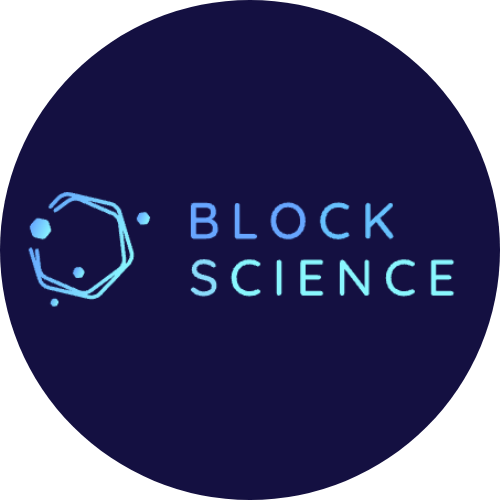
Block Science
BlockScience, founded in 2017, is an R&D, engineering, and analytics firm that specializes in the design and analysis of complex systems. With an interdisciplinary team of engineers, data scientists, and social scientists, the company applies advanced mathematical and computational engineering to model, simulate, and design resilient socio-technical systems for a diverse range of clients, including for-profit companies, non-profits, and government organizations.
The firm's core service is providing a rigorous, data-driven approach to designing and validating economic and governance mechanisms. A key product in their toolkit is cadCAD, an open-source Python-based modeling framework they developed. This tool allows for the creation of "digital twins" of complex systems, enabling clients to simulate and test new business models, market designs, or automated smart contract logic before deployment. This approach is used to analyse system safety, resilience, and sustainability under various conditions.
BlockScience has a direct collaboration with Hedera and the Hedera Foundation to design and model innovative market mechanisms for renewable energy and other environmental assets. This work includes the development of Automated Regression Market Makers (ARMMs), a novel price discovery mechanism for semi-fungible assets like energy credits.
Project Information
Related Projects

HashSea is a dedicated NFT marketplace and launchpad platform operating on the Hedera blockchain network. It provides a space for creators and buyers to mint live, purchase assets on secondary market or create their own NFT assets while engaging with the other digital assets native to the Hedera network.
As a marketplace, HashSea facilitates the discovery, purchase, and sale of Hedera NFTs, leveraging the network's high throughput and remarkably low, predictable transaction fees. Meanwhile, functioning as a launchpad, HashSea empowers creators by offering tools and services to easily mint and debut new projects directly to the Hedera ecosystem. This dual role positions HashSea as a key enabler for both established and emerging artists and developers looking to capitalize on Hedera's efficient, carbon-negative infrastructure.
HashSea’s utilization of the Hedera Token Service (HTS) allows it to offer features embedded features such as native, enforceable royalties for creators and near instant transactions. It supports the HashPack wallet for minting, listing, and trading NFTs on the Hedera blockchain network.

Acoer is an Atlanta-based technology firm founded in 2015 that specialises in developing blockchain-enabled software for the healthcare industry. The company's mission is to make health data more connected, usable, and secure by creating interoperable solutions that break down data silos and provide real-time insights.
Acoer's product suite includes the Health Data Explorer for analyzing medicolegal death investigation data, and HashLog, a data management and visualization tool. One of its key technologies is the Cryptographic Data Mesh, which creates a tamper-proof, auditable trail for data transactions. The company also developed RightsHash, a decentralised engine that uses NFTs to manage individual rights, such as patient consent for clinical trials.
Acoer's solutions are fundamentally integrated with the Hedera network. The company utilises the Hedera Consensus Service (HCS) to create immutable logs of data transactions, ensuring a verifiable "chain of custody" for sensitive health information. This allows Acoer to provide computational trust and cryptographic proof of data authenticity.

Nexera is a technology company building infrastructure to unite traditional and decentralized finance. Its core mission is to enable the tokenization of real-world assets within a compliant and institutional-grade framework, addressing key barriers that have slowed widespread adoption of blockchain in capital markets.
The cornerstone of this vision is the Nexera Chain, a Layer 1 blockchain specifically designed to be compliance-ready from the ground up. The chain integrates all essential elements for institutional use, including robust tools for regulation and compliance. This is powered by Compilot.ai, an engine that automates complex legal and regulatory demands such as KYC, KYB, and AML into straightforward, AI-driven workflows. The architecture ensures that institutions can meet rigorous standards like MiCA without relying on fragmented third-party solutions.
A critical feature of Nexera's ecosystem is its focus on interoperability, allowing for fluid asset transfers and transparent data flow between public blockchains, private networks, and legacy financial systems. The protocol’s cross-chain capabilities are secured in part by the Hedera Consensus Service (HCS). HCS is used as a trust layer to verifiably and transparently log transactions that occur across different networks, ensuring a secure and auditable record of all activity.

Howlite is a Canadian technology company that is focused on providing innovative solutions for the creator economy. The company's mission is to empower creators by providing them with the tools and infrastructure to build and manage their own decentralized communities and economies.
The core of Howlite's service is a comprehensive, no-code platform that allows creators to launch and manage their own social tokens and NFTs. The platform is designed to be a one-stop-shop for creators, providing everything from token creation and distribution to community management and governance tools. The platform also includes features for creating token-gated content and experiences, as well as a marketplace for trading creator tokens and NFTs.
The Howlite platform is built on the Hedera network. It uses the Hedera Token Service (HTS) for the creation and management of all digital assets on the platform, while the Hedera Consensus Service (HCS) provides a transparent and auditable record of all community governance activities.
